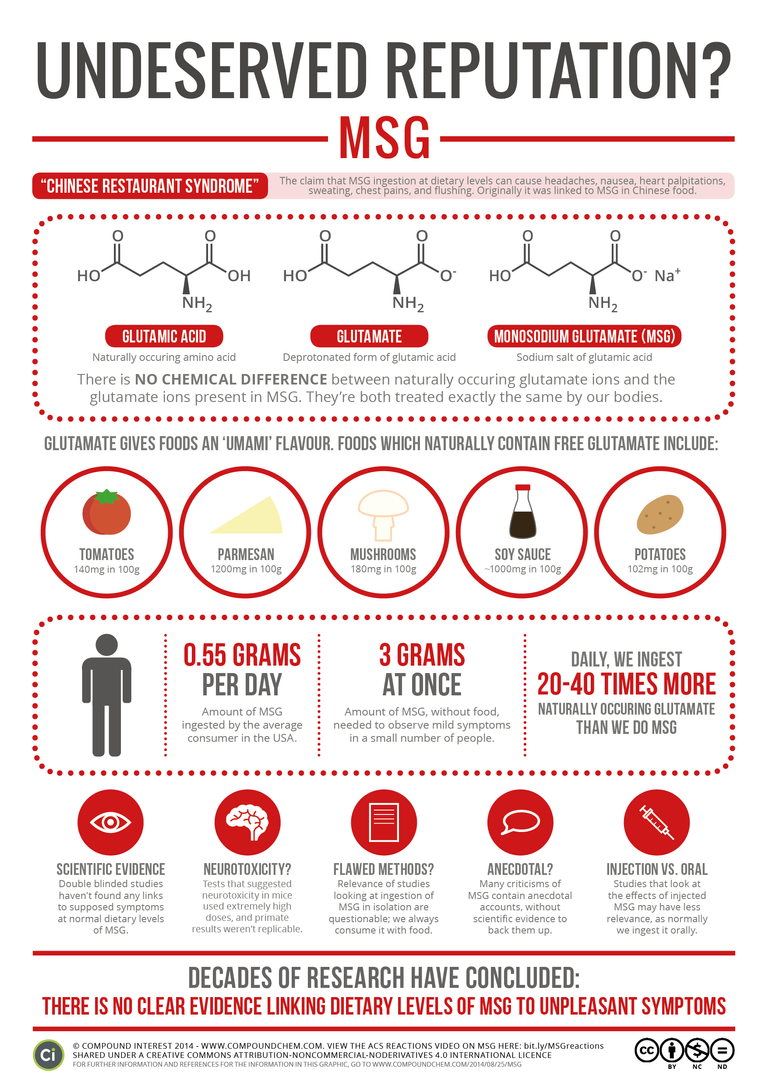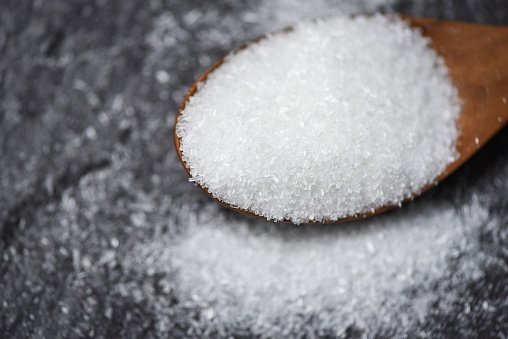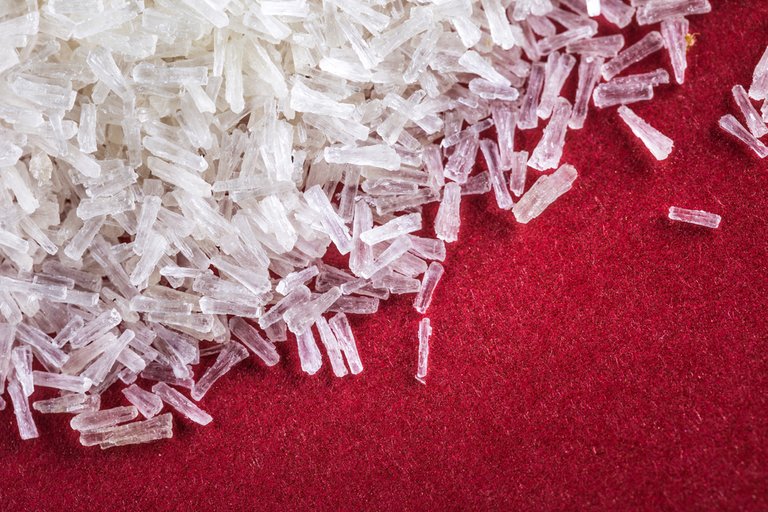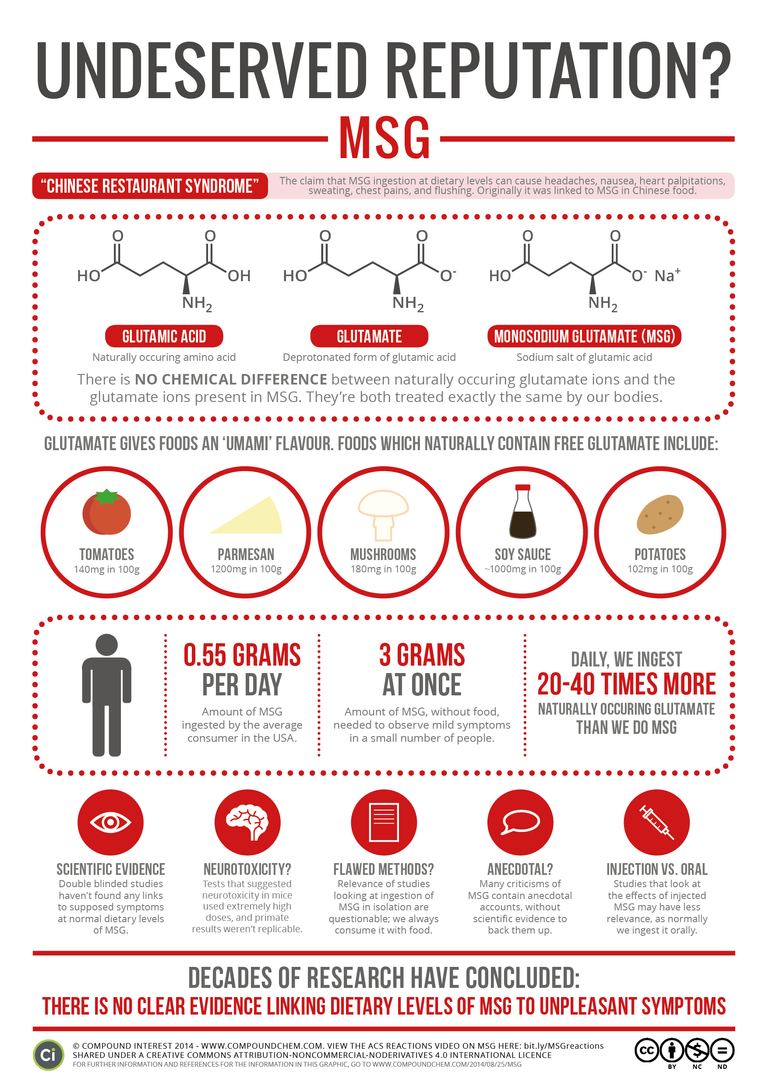Monosodium Glutamate: Is it bad or not? // Glutamato Monossódico: Faz mal ou não?
For anyone interested in health issues and all of their variations and nuances (including controversial issues that may or may not be in conspiratorial areas of study), the monosodium glutamate issue is not as random as it may seem to an unsuspecting person. It is not today (or yesterday) that Glutamate causes a certain apprehension in those who are concerned with what they consume. And for those of you who don't care about that sort of thing, glutamate is just that indispensable item on your processed food ingredient list: "monosodium glutamate flavor enhancer."

Source
As one of the most abundant non-essential amino acids in nature (yes, that's right), it's strange to think that it can do so much harm. But is it bad? Let's do it by steps. As I was saying, glutamate is present in hundreds, in fact, thousands of foods. Extremely present in mushrooms and tomatoes, for example, but also in cheeses and many other foods, it has always been present in our food in a natural way and without any influence from processed food from some supposed industry of death. However, at a certain point (around 1908) the human being managed to synthesize glutamate from a kombu alga, and discovered its potential to enhance flavors, as well as discovering a new "taste" that the language would be able to feel, the "umami". From then onwards, this amino acid became common in human food in much of the world, and along with that, many people began to assume that it was toxic to health, whether for good reasons or not.

Source
For years all the toxicity assumptions of its use have been refuted by reliable studies. The strongest study in favor of glutamate toxicity was actually very poorly done and presented extremely unlikely data. Glutamate when consumed (remember, common foods have much more glutamate in everyday life than this extra additive present in food), it is broken down within our body, and mainly, it DOES NOT pass through the blood-brain barrier present in the intestine, so , does not go into the blood. In this study, which sought to prove glutamate's problems, researchers injected huge amounts of glutamate directly into the bloodstream of rats.

Source
Perhaps the biggest problem in this controversy is that there are glutamatergic neurotransmitters in our brain, that is, glutamate is necessary in the brain and has excitatory functions and is often related to anxiety problems, psychotic crises and so on. Which makes us think with common sense that by consuming monosodium glutamate you will be clogged up of glutamatergic neurotransmitters and thus worsening your brain/psychological health. However, some studies have already shown that this does not happen, mainly due to the already mentioned blood-brain barrier, which does not allow the passage of glutamate into the blood/brain. My only personal doubt is about people who have problems with the blood-brain barrier, the now famous condition called "leaky gut". Maybe this kind of problem makes glutamate seep through. And thinking that leaky gut has become a severe problem in today's society given our poor diet, extra care is something to consider.

Source
Anyway, everything indicates that monosodium glutamate is not dangerous for our health, mainly because we already consume it daily and naturally, and second because our natural defenses do not confuse things, we have our own production of this neurotransmitter. But even so, I have always been (and I believe I will always be) a little averse to the use of industrialized products, albeit in a rather hypocritical way, since I am a great consumer of sweets, and despite my regrets, I prefer to avoid taking risks. I'm not the type of person who would buy a pot of ajinomoto to season my meat and whenever possible I choose industrialized products that are not made with monosodium glutamate.
here is the list of references on the topic:
BOUTRY, C et al. Effects of monosodium glutamate supplementation on glutamine metabolism in adult rat. Frontiers in Bioscience, 279-290; 2011.
NIAZ, K; ZAPLATIC, E; SPOOR, J. EXTENSIVE USE OF MONOSODIUM GLUTAMATE: A THREAT TO PUBLIC HEALTH? EXCLI Journal 2018;17:273-278
FERNSTROM, J. D. Monosodium Glutamate in the Diet Does Not Raise Brain Glutamate Concentrations or Disrupt Brain Functions. Ann Nutr Metab 2018;73(suppl 5):43–52
WERNERMAN, J. Clinical Use of Glutamine Supplementation. The Journal of Nutrition, 2008
CRUZAT, V. F; PETRY, E. D; TIRAPEGUI, J. Glutamina: aspectos bioquímicos, metabólicos, moleculares e suplementação. Revista Brasileira de Medicina do Esporte, Octorber 2009
HAZZAA, S. M et al . Monosodium glutamate induces cardiac toxicity via oxidative stress, fibrosis, and P53 proapoptotic protein expression in rats. Environmental Science and Pollution Research. March, 2020.
HENRY-UNAEZE, H. Update on food safety of monosodium l-glutamate (MSG). Pathophysiology, (2017).
OBAYASHI, Y; NAGAMURA, Y. Does monosodium glutamate really cause headache? : a systematic review of human studies. The Journal of Headache and Pain (2016) 17:54
SINGH, M. Fact or Fiction? The MSG Controversy (2005 Third Year Paper). HARVARD LAW SCHOOL.
WILLIAMS, A. N; WOESSNER, K.M. Monosodium glutamate ‘allergy’: menace or myth? Clinical & Experimental Allergy, 39, 640–646, 2009.
ZHOU, Y; YANG, M; DONG, B. R. Monosodium glutamate avoidance for chronic asthma in adults and children (Review). Cochrane Database of Systematic Reviews 2012, Issue 6. Art. No.: CD004357.

Source
Thômas Helon Blum

Para quem é interessado nos temas de saúde e em todas as suas variações e nuances (incluindo os temas polêmicos que podem ou não estar em zonas conspiratórios de estudos), o tema do glutamato monossódico não é tão aleatório quanto pode parecer a um desavisado. Não é de hoje (nem de ontem) que o Glutamato causa uma certa apreensão em quem se preocupa com o que consome. E para vocês que não se preocupam com esse tipo de coisa, o glutamato é apenas aquele item indispensável na lista de ingredientes do seu alimento processado: "realçador de sabor glutamato monossódico".

Source
Sendo um dos aminoácidos não essenciais mais abundantes existentes na natureza (sim, isso mesmo), é estranho pensar que ele possa fazer tão mal. Mas ele faz mal? Vamos por partes. Como eu ia dizendo, o glutamato está presente em centenas, aliás, milhares de alimentos. Extremamente presente nos cogumelos e no tomate por exemplo, mas também em queijos e tantos outros alimentos, ele sempre esteve presente em nossa alimentação de forma natural e sem qualquer influência de alimentação processada de alguma suposta indústria da morte. Porém, em determinado momento (lá por 1908) o ser humano consegui sintetizar o glutamato à partir de uma alga kombu, e descobriu seu potencial para realçar sabores além de junto a isso descobrir um novo "gosto" que a lingua seria capaz de sentir, o "umami". Dali para frente esse aminoácido tornou-se comum na alimentação humana de boa parte do mundo, e junto a isso, muitas pessoas começaram a supor que ele era tóxico a saúde, seja por bons motivos ou não.

Source
Durante anos todas as suposições de toxicidade de seu uso foram refutados por estudos confiáveis. O estudo mais forte à favor da toxicidade do glutamato foi inclusive muito mal feito e apresentou dados extremamente improváveis. O glutamato ao ser consumido (lembrando, os alimentos comuns apresentam muito mais glutamato no dia a dia do que esse aditivo extra presente nos alimentos), é quebrado dentro de nosso organismo, e principalmente, ele NÃO passa na barreira hematoencefálica presente no intestino, logo, não vai para o sangue. Nesse estudo que buscava provar os problemas do glutamato, os pesquisadores injetavam glutamato em imensas quantidades diretamente na corrente sanguínea dos ratos.

Source
Talvez o maior problema dessa polêmica seja que existe em nosso cérebro os neurotransmissores glutamatérgicos, ou seja, o glutamato é necessário no cérebro e tem funções excitatórias e muitas vezes está relacionado a problemas de ansiedade, crises de psicose e assim por diante. O que nos faz pensar com um senso comum que consumindo glutamato monossódico, você estará entupindo-se de neurotransmissores glutamatergicos e piorando assim sua saúde cerebral/psicológica. Porém, alguns estudos já comprovaram que isso não se dá, principalmente pela já comentada barreira hematoencefálica, que não permite a passagem do glutamato para dentro do sangue/cérebro. Minha única dúvida pessoal que fica é a respeito de pessoas que tem problemas na barreira hematoencefálica, a atualmente famosa condição chamada de "leaky gut". Talvez esse tipo de problema faça o glutamato infiltrar-se sim. E pensando que leaky gut tem se tornado um problema severo na sociedade atual dado nossa deturpada alimentação, um cuidado extra é algo a se considerar.

Source
Enfim, tudo indica que o glutamato monossódico não é perigoso para nossa saúde, principalmente por que já consumimos ele diariamente e naturalmente, e segundo por que nossas defesas naturais não confundem as coisas, temos nossa própria produção desse neurotransmissor. Mas ainda assim, eu sempre fui (e creio que sempre serei) meio avesso ao uso de industrializados, ainda que de forma bastante hipócrita, já que sou um exímio consumidor de doces, e apesar dos pesares, prefiro evitar arriscar-me. Não sou o tipo de pessoa que compraria um pote de ajinomoto para temperar minha carne e sempre que possível escolho os produtos industrializados que não são produzidos com glutamato monossódico.
aqui vai a lista de referências sobre o tema:
BOUTRY, C et al. Effects of monosodium glutamate supplementation on glutamine metabolism in adult rat. Frontiers in Bioscience, 279-290; 2011.
NIAZ, K; ZAPLATIC, E; SPOOR, J. EXTENSIVE USE OF MONOSODIUM GLUTAMATE: A THREAT TO PUBLIC HEALTH? EXCLI Journal 2018;17:273-278
FERNSTROM, J. D. Monosodium Glutamate in the Diet Does Not Raise Brain Glutamate Concentrations or Disrupt Brain Functions. Ann Nutr Metab 2018;73(suppl 5):43–52
WERNERMAN, J. Clinical Use of Glutamine Supplementation. The Journal of Nutrition, 2008
CRUZAT, V. F; PETRY, E. D; TIRAPEGUI, J. Glutamina: aspectos bioquímicos, metabólicos, moleculares e suplementação. Revista Brasileira de Medicina do Esporte, Octorber 2009
HAZZAA, S. M et al . Monosodium glutamate induces cardiac toxicity via oxidative stress, fibrosis, and P53 proapoptotic protein expression in rats. Environmental Science and Pollution Research. March, 2020.
HENRY-UNAEZE, H. Update on food safety of monosodium l-glutamate (MSG). Pathophysiology, (2017).
OBAYASHI, Y; NAGAMURA, Y. Does monosodium glutamate really cause headache? : a systematic review of human studies. The Journal of Headache and Pain (2016) 17:54
SINGH, M. Fact or Fiction? The MSG Controversy (2005 Third Year Paper). HARVARD LAW SCHOOL.
WILLIAMS, A. N; WOESSNER, K.M. Monosodium glutamate ‘allergy’: menace or myth? Clinical & Experimental Allergy, 39, 640–646, 2009.
ZHOU, Y; YANG, M; DONG, B. R. Monosodium glutamate avoidance for chronic asthma in adults and children (Review). Cochrane Database of Systematic Reviews 2012, Issue 6. Art. No.: CD004357.

Source